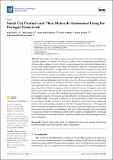Smart City Products and Their Materials Assessment Using the Pentagon Framework
Author(s)
Ponce, Pedro; Rojas, Mario; Mendez, Juana Isabel; Anthony, Brian; Bradley, Russel; Fayek, Aminah Robinson; ... Show more Show less
Downloadmti-09-00001.pdf (15.83Mb)
Publisher with Creative Commons License
Publisher with Creative Commons License
Creative Commons Attribution
Terms of use
Metadata
Show full item recordAbstract
Smart cities are complex urban environments that rely on advanced technology and data analytics to enhance city services’ quality of life, sustainability, and efficiency. As these cities continue to evolve, there is a growing need for a structured framework to evaluate and integrate products that align with smart city objectives. This paper introduces the Pentagon Framework, a comprehensive evaluation method designed to ensure that products and their materials meet the specific needs of smart cities. The framework focuses on five key features—smart, sustainable, sensing, social, and safe—collectively called the Penta-S concept. These features provide a structured approach to categorizing and assessing products, ensuring alignment with the city’s goals for efficiency, sustainability, and user experience. The <i>Smart City Pentagon Framework Analyzer</i> is also presented, a dedicated web application that facilitates interaction with the framework. It allows product data input, provides feedback on alignment with the Penta-S features, and suggests personality traits based on the OCEAN model. Complementing the web application, the <i>Smart City Penta-S Compliance Assistant</i> API, developed through ChatGPT, offers a more profound, personalized evaluation of products, including the life cycle phase recommendations using the IPPMD model. This paper contributes to the development of smart city solutions by providing a flexible framework that can be applied to any product type, optimizing its life cycle, and ensuring compliance with the Pentagon Framework. This approach improves product integration and fosters user satisfaction by tailoring products and their materials to meet specific user preferences and needs within the smart city environment. The proposed framework emphasizes citizen-centric design and highlights its advantages over conventional evaluation methods, ultimately enhancing urban planning and smart city development.
Date issued
2024-12-25Department
Massachusetts Institute of Technology. Department of Mechanical EngineeringJournal
Multimodal Technologies and Interaction
Publisher
Multidisciplinary Digital Publishing Institute
Citation
Ponce, P.; Rojas, M.; Mendez, J.I.; Anthony, B.; Bradley, R.; Fayek, A.R. Smart City Products and Their Materials Assessment Using the Pentagon Framework. Multimodal Technol. Interact. 2025, 9, 1.
Version: Final published version